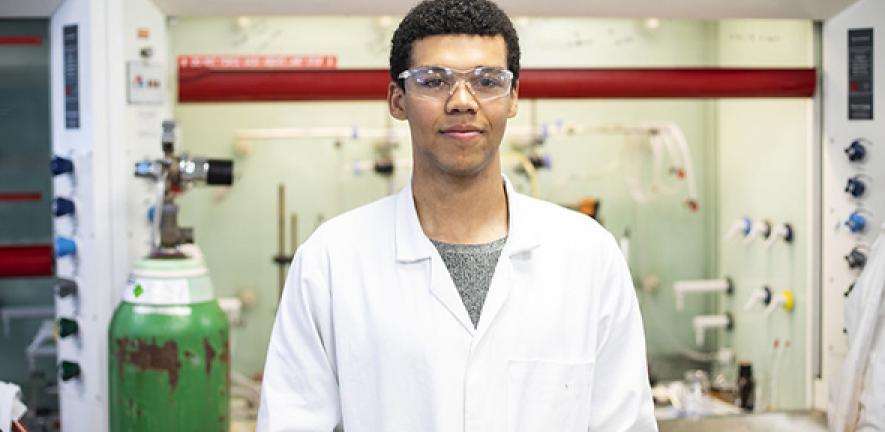
Haydn is working with Professor Clare Grey on the Battery 'Degradation' project – a search for ways to improve the performance and reliability of batteries so the electric vehicles that use them can travel further, and for longer, before they need recharging.
As Haydn explains in the video below, 'degradation' is the term used to describe all the processes that lead a battery's performance to decrease over its lifetime.
"As an electric vehicle battery degrades, you lose the amount of distance you can cover. We need to fully understand degradation and find ways to slow it down."
"When your phone is fresh out of the box and you charge it for the first time, you get a nice long battery life," Haydn says. "But by the fiftieth time you charge it, it runs out before you expect.
"On a mobile phone, this is annoying. But when it comes to an electric vehicle, battery degradation means you are losing the amount of distance you can cover. So it’s really important that we target a full understanding of battery degradation so we can use materials, and build in measures, to slow these processes down as much as possible."
His four-year PhD programme, and the Battery 'Degradation' Project, is being funded by the Faraday Institution, an independent institute supporting electrochemical energy storage research. And they have produced this outreach video, to explain what they are doing, and why they are supporting PhD researchers like Haydn.
The project is important, Haydn says, as the science of battery operation is much more complex than many people appreciate. "In fact the number of ways a battery can degrade is so numerous, it's a bit of a miracle they work at all!"
Tracking battery degradation in real time
In his project, he is looking for ways to track the degradation of batteries in real time while they're in operation.
"If we could do that, it would give us more clues about the exact mechanisms of battery degradation," he says, "and it could be used as a diagnostic tool – so you could get an instant reading of the health of your battery. This means that if your battery is in an operating electric vehicle, you can adjust how the battery is operated. And at the end of its life, you can tell what kind of second-life application it might be useful for."
One way of measuring a battery’s degradation is by tracking the depletion of lithium within it. "Lithium is the currency in which batteries operate," Haydn says. "It is the lithium ion that is being passed from one electrode to another during a battery’s operation."
Doing this inside a car while it's travelling is currently challenging. So Haydn is experimenting with making fluorescent molecules whose light emission changes when they interact with lithium.
"If you have an electrolyte solution containing lithium ions inside the battery," he says, "you can measure how much lithium there is by tracking how much the light signal from the molecule changes. That's because the interaction of the molecule with lithium is dependent on the concentration of lithium in the solution."
Haydn is enjoying his research. "It's pretty amazing to be doing this," he says, "because there aren't that many projects that would offer me the chance to combine my interests in organic chemistry and energy storage." He is being co-supervised in this project by Professor Gray and Dr Hugo Bronstein.
Encouraging more BAME students to study science
He is also enjoying the opportunities offered by the Faraday Institution programme to promote science in schools and encourage more BAME students to study science.
"A Master's student told me she wanted to go on to a PhD, but hadn't seen anyone from her ethnic background pursuing postgraduate study at her university."
"I've never felt that there was a barrier stopping me," Haydn says. "But I was at one outreach event in London when a Master's student told me she was excited to meet me because 'I've never seen anyone who looks like me doing a PhD'. She was at a UK university, hoping to go on to a PhD, but hadn't seen anyone from her ethnic background pursuing postgraduate study at her institution.
"That was an eye-opener," he adds. "There may not be physical barriers stoppping BAME students from pursuing science. But there aren’t yet enough visible role models to show them the route is open to them."

